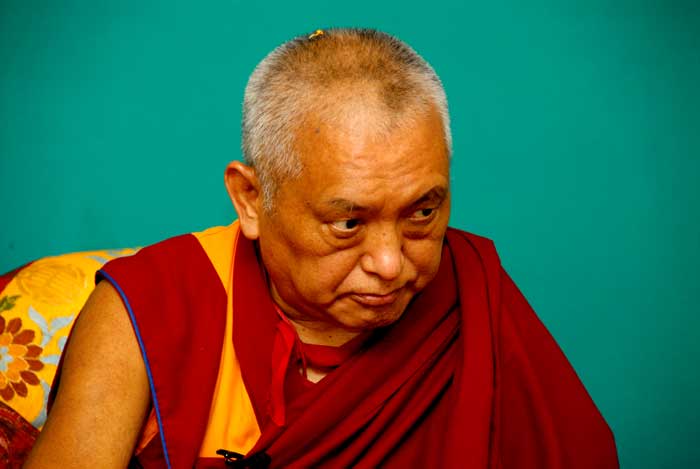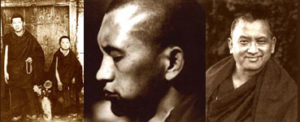

Lama Zopa Rinpoche is the reincarnation of the Sherpa Nyingma yogi Kunsang Yeshe, the Lawudo Lama. Rinpoche was born in 1946 in Thami to a very poor family, not far from the cave Lawudo, in the Mount Everest region of Nepal, where his predecessor meditated for the last twenty years of his life. While his predecessor had belonged to the Sakya tradition of Tibetan Buddhism, the Lawudo Lama himself had been a great master of the complete tantric teachings of the Nyingma tradition.
Rinpoche left Thami when he was about 4 years old and was put in a Monastery that was very close to the border of Nepal and Tibet. Rinpoche stayed at this Monastery for several years until he went to Tibet and took getsul ordination in 1958, and continued his studies in Domo Geshe’s monastery in Phagri, Tibet.
In 1959 Rinpoche escaped from Tibet and continued his studies in Sera Jhe monastery in Buxa Duar, in the north of India. This is where the Indian Government housed the monks from Sera, Ganden and Drepung Monasteries who wanted to continue their studies, along with monks from the other sects. It was at Buxa Duar that Rinpoche became the disciple of Geshe Rabten Rinpoche and then of Lama Thubten Yeshe. Frida Bedi then invited him to join her school for incarnate lamas in Dalhousie where they were given the chance to learn English for 6 months. Upon the completion returned to Buxa Duar and his studies.
In 1971 Rinpoche took gelong ordination from His Holiness Ling Rinpoche in Bodh Gaya. By 1975, twelve centers had started. In 1976, the growing worldwide organization was named by Lama Yeshe ‘the Foundation for the Preservation of the Mahayana Tradition’ (FPMT). The FPMT is an organization devoted to the transmission of the Mahayana Buddhist tradition and values worldwide through teaching, meditation and community service.
There are 147 FPMT centers and projects worldwide as of March 2007.
FPMT currently has 8 standard Buddhist education programs that are taught in many of the centers. Two of these, the Masters Program and the Basic Program are committed courses of 6 and 5 years of study respectively. Based on the great philosophical texts studied in the monasteries of Tibet, FPMT holds to rigid standards of translation and has a passion for authentic texts to ensure that complete accuracy of the meaning found within these profound texts is not forfeited in the transmission from East to West.
Lama Zopa Rinpoche has many other projects around the world; one of the most important is the 500ft Maitreya Statue that Rinpoche is building in Bodh Gaya that will include schools, hospitals and other social projects such as Leprosy clinics (these social projects are already in existence and have been functioning for the last 15 years). Some of the other projects that Rinpoche has founded are Sera Jhe food fund – which offers breakfast, lunch and dinner everyday to 2700 monks. The Lama Tsong Khapa teacher fund offers an allowance to the main 100 teachers in the Gelukpa tradition from various monasteries. Rinpoche also has a number of other funds that are for building holy objects, such as Stupas, prayer wheels etc. Rinpoche has a very strong interest in collecting texts from all the different traditions.
རྙིང་མའི་རིག་འཛིན་ཀུན་བཟང་ཡེ་ཤེས་མཆོག་གི་ཡང་སྲིད་ལའུ་རྡོ་སྐྱབས་རྗེ་བླ་མ་ཐུབ་བསྟན་བཟོད་པ་རིན་པོ་ཆེ་མཆོག་གི་ལོ་རྒྱུས།
རྙིང་མའི་རིག་འཛིན་ཀུན་བཟང་ཡེ་ཤེས་མཆོག་གི་ཡང་སྲིད་ལའུ་རྡོ་སྐྱབས་རྗེ་བླ་མ་ཐུབ་བསྟན་བཟོད་པ་རིན་པོ་ཆེ་མཆོག་ནི། ཕྱི་ལོ་༡༩༤༦ལོར་བལ་ཡུལ་སོ་ལུ་ཁམ་བུའི་ཐ་མི་ཞེས་པའི་གྲོང་ཚོའི་ཁྱིམ་ཚང་དུ་སྐུ་འཁྲུངས། དགུང་ལོ་བཅུ་པའི་ཚེ་ཕག་རི་ལ་ཕེབས་སྐབས་སྨིན་གྲོལ་གླིང་དུ་སློབ་གཉེར་གནང་འདུན་ཡོད་ཀྱང་ལས་སྨོན་དབང་གིས་མི་གྲུབ་པ་བྱུང་། ཕྱག་མཛོད་བློ་བཟང་རྒྱ་མཚོའི་གཟིགས་སྐྱོང་འོག་གྲོ་མོ་དུང་དཀར་དགོན་དང་པད་མ་ཆོས་གླིང་དགོན་དུ་ལོ་གསུམ་བཞུགས་་རིང་དགེ་ཚུལ་གྱི་སྡོམ་པ་མནོས་ཏེ་རྗེ་ཙོང་ཁ་པ་ཆེན་པོའི་བསྟན་པའི་ཆོས་སྒོར་ཞུགས་ནས་དམིགས་བརྩེ་མའི་ལྗགས་བསྙེན་བཏང་བར་གནང་། བྲ་ཏི་ཕྱག་མཛོད་བློ་བཟང་རྒྱ་མཚོ་དང་ལྷན་དུ་སེ་རྭར་ཕེབས་འདུན་ཡོད་ཀྱང་། ཕྱི་ལོ་༡༩༥༩ལོར་གྲོ་མོར་རྒྱ་དམར་སླེབས་ཉེའི་མཚམས་སུ་འབྲུག་བརྒྱུད་རྒྱ་གར་ཤར་ཕྱོགས་སྦག་ས་ཆོས་སྒར་དུ་ཕེབས་ཞུགས་གནང་། དེ་ནས་སེར་བྱེས་སྐྱབས་རྗེ་མཁན་ཟུར་རིན་པོ་ཆེ་རྗེ་བཙུན་བློ་བཟང་དབང་ཕྱུག་མཆོག་ནས་སེར་བྱེས་གྲྭ་ཚང་དང་བྲ་ཏི་ཁང་ཚན་ལ་ཆོས་ཞུགས་གནང་ན་ལེགས་ཚུལ་བཀའ་ཕེབས་ལྟར་གྲྭ་ཚང་དང་ཁང་ཚན་གཉིས་སུ་ཆོས་ཞུགས་མཛད། སེར་བྱེས་ཏྲེ་ཧོར་དགེ་བཤེས་རྟ་མགྲིན་རབ་བརྟན་དང་། དགེ་བའི་བཤེས་གཉེན་བླ་མ་ཐུབ་བསྟན་ཡེ་ཤེས་སོགས་མཁས་དབང་དུ་མའི་ཞབས་ལ་བཏུག་ནས་ལམ་རིམ་དང་བྱམས་སྙིང་རྗེ་སོགས་ལ་ཉམས་བཞེས་དང་། མཚན་ཉིད་གཞུང་ལ་གསན་སྦྱོང་མཛད། ཕྱིས་སུ་ཀོ་པན་སོགས་སུ་སྒྲུབ་པ་ཉམས་ལེན་གཙོ་བོར་མཛད་པ་དང་། ༧གོང་ས་མཆོག་གིས་གཙོས་རིས་མེད་ཀྱི་བཤེས་གཉེན་དུ་མའི་དྲུང་དུ་མདོ་སྔགས་ཀྱི་ཆོས་ཟབ་རྒྱས་གསན། ཐུབ་པའི་བརྟུལ་ཞུགས་ལ་གནས་ནས་མདོ་སྔགས་ཀྱི་ཆོས་ལ་ཉམས་བཞེས་གནང་བར་མ་ཟད་སེར་བྱེས་འདུས་མང་ཡོངས་ཀྱི་འཚོ་བའི་མཐུན་རྐྱེན་ཐད་དཀའ་ངལ་ཆེ་སྐབས་བསྟན་པ་ལ་དགོངས་པ་ཆེ་བཞེས་ཀྱིས་དགེ་འདུན་གྱི་གསོལ་ཚིག་ནར་གཏོང་གནང་བས་སློབ་གཉེར་བ་རྣམས་ཀྱི་འཚོ་བའི་དཀའ་ངལ་བསལ་ཞིང་སློབ་གཉེར་གོང་འཕེལ་བྱུང་བ་སོགས་ཀྱི་བཀའ་དྲིན་བླ་མེད་དུ་ཆེ་བ་མ་ཟད་གྲྭ་ཚང་གི་ཚོགས་སྡེ་ཁག་དང་། ལྗང་དགུན་ཆོས། དགེ་ལུགས་རྒྱུགས་སྤྲོད། དཔེ་ཁྲིད་རྒན་སོ་སོའི་མཐུན་རྐྱེན་གནང་མུས་ཡིན། ལྷག་དོན་ཁང་ཚན་གྱི་གཙུག་ལག་ཁང་གསར་རྙིང་རྟེན་དང་བསྟེན་པ་དང་གྲྭ་ཤག་གསར་རྒྱག་གྱི་མཐུན་རྐྱེན་འཛད་མེད་དུ་སྦྱར་སྟེ་ལེགས་གྲུབ་བྱུང་བ་དང་། ཁང་ཚན་ནས་ཇི་ལྟར་གསོལ་བ་བཏབ་པ་བཞིན་སྐུ་ངལ་འཛེམ་མེད་ཀྱིས་༢༠༠༩ལོའི་གཙུག་ལག་ཁང་གསར་པའི་དབུ་འབྱེད་མཛད་སྒོར་ཆིབས་བསྒྱུར་བསྐྱངས་བ་དང་། དེང་གི་དུས་འཛམ་གླིང་ཤར་ནུབ་ཡུལ་གྲུ་ཀུན་ཏུ་བསྟན་པ་དང་འགྲོ་བ་ལ་གང་ལ་གང་འདུལ་གྱིས་ཟབ་རྒྱས་ཀྱི་ཆོས་ཀྱི་བདུད་རྩི་རྒྱ་ཆེར་སྤེལ་བར་མཛད་ནས་བསྟན་པའི་མཛད་འཁུར་བླ་མེད་དུ་བསྐྱངས་སྟེ་ཞུགས་མུས་ཀྱི་མཛད་རྣམ་སྙིང་བསྡུས་སུ།། །།
For more information please visit www.fpmt.org
